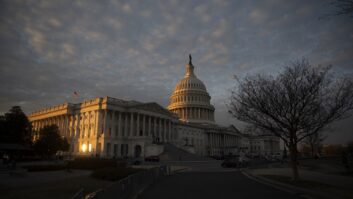Feb.13 marks the fifth anniversary of World Radio Day. With this year’s emphasis on “radio in times of emergency and disaster,” UNESCO is organizing several celebrations worldwide, highlighting the important role radio plays in disseminating information in the event of crisis. Radio World spoke with Mirta Lourenço, chief, Media Development and Society of UNESCO, to ask about the reasons behind such an initiative, its goals and its vision of radio in a changing media landscape.

Mirta Lourenço is chief, Media Development and Society at UNESCO
Radio World: How did World Radio Day begin and why?
Mirta Lourenço: Spain proposed it to UNESCO, which then began a wide consultation process in June 2011. The consultation included all stakeholders — broadcasting associations; public, state, private, community and international broadcasters; UN agencies; funds and programs; topic-related NGOs; academia; foundations and bilateral development agencies; as well as UNESCO Permanent Delegations and National Commissions.
Ninety-one percent were in favor of the project. The leader of the project, the Academia Española de la Radio, received over 46 letters of support from diverse stakeholders, including the Arab States Broadcasting Union (ASBU), the Asia-Pacific Broadcasting Union (ABU), the African Union of Broadcasting (AUB), the Caribbean Broadcasting Union (CBU), the European Broadcasting Union (EBU), the International Association of Broadcasting (IAB), the North American Broadcasters Association (NABA), the Organización de Telecomunicaciones Ibeoramericanas (OTI), BBC, URTI and Vatican Radio.
The 36th session of the UNESCO General Conference in 2011 proclaimed Feb. 13, the day United Nations Radio was established in 1946, as World Radio Day.
On Jan. 14, 2013, the United Nations General Assembly formally endorsed UNESCO’s proclamation of World Radio Day at its 67th Session, thereby becoming a day to be observed by all UN agencies, programs and funds and their partners. During its 67th Session, the UN General Assembly endorsed the adopted resolution.
RW: Who runs the event?
ML: UNESCO leads the observation and chairs the World Radio Day Committee, which is composed of regional and international broadcasting organizations. Together we decide a theme each year and then every institution or country observing this day respects the theme in different ways.
RW: What is new this year?
ML: This year the theme is “radio in disaster and emergency” and we have established partnership with the International Red Cross and Red Crescent Federation, humanitarian NGOs, apart from our traditional partnership with radio stations. We have also partnered with France Médias Monde, which comprises Radio France Internationale (RFI), France 24, Monte Carlo Doualiya, Cadena SER (Prisa) and Web-radio station provider Saooti.com.
On Feb. 13 an exclusive 19 hour-broadcast, produced by RFI in French, MCD in Arabic and Cadena Ser in Spanish will be available for streaming or download at www.worldradioday.org. RFI will also offer additional programs in Russian, English and Chinese. This year we have put effort into highlighting how radio, an accessible and available medium that offers real time coverage, can help prevent and mitigate disasters and the associated human costs.
RW: What are UNESCO’s goals in organizing such an event?
ML: UNESCO aims to raise greater awareness among the public and media of the importance of radio; to encourage decision makers to establish and provide access to information through radio; as well as to enhance networking and international cooperation among broadcasters. UNESCO’s dedicated website offers copyright-free content and stories on radio and provides audio material and many other resources to radio stations, schools, libraries — for anyone interested in celebrating radio!
RW: What does UNESCO want radio organizations reading this to do now (or next year) in celebration of World Radio day?
ML: We would like organizations to visit www.worldradioday.org, pick up the audio they find interesting and broadcast it, register their activity on the map, use the banners and logo; and invite their listeners to visit the website to learn about radio in emergency and disasters. The dedicated website also offers 15 ideas on how to celebrate World Radio Day so each station can celebrate in its own way with its audience.
RW: Can you provide examples of how organizations are getting involved?

ML: There are many celebrations being organized before and during Feb. 13. Some events have already been registered on our site. Those interested can check our map to discover the nearest celebration to them.
There are thematic debates being organized, film projections, display of radio gear, special shows being broadcast, exhibits, contests and online events. Every organization can choose its own way to celebrate, in accordance with certain sub-themes. These include: radio empowers survivors and vulnerable people, who have a right their privacy protected; the protection of radio frequencies in times of emergency; radio’s social impact and ability to provide access to information, the right to information; freedom of expression and journalists’ safety; and radio saves lives.
RW: With all the new forms of “radio” and audio consumption (vs. traditional radio), how does World Radio Day define “radio”?
ML: It’s audio with a multiplatform media distribution and journalistic standards. Listeners use different delivery technologies depending on their situation, such as location at a specific point of time, personal preference, availability of device, social position, etc. This confirms the relevance of radio and the fact that new information and communication technologies have not relegated radio; on the contrary radio has multiplied its audience thanks to them. Excluding one technology would cut out part of the audience in certain situations. In the case of an emergency or disaster, it is still a good idea however to have an old transistor radio at hand because roads, houses and material may be destroyed and even one’s cellphone battery may run out. But there will still be the need to get the latest news and information in order to survive.
RW: Is this an effort aimed at traditional over-the-air formats or is UNESCO also targeting streaming services and podcasts, etc?
ML: No, not at all. The future of radio is digital and the digitization of shortwave and AM broadcasting is underway. We also have satellite radio. The challenges that radio faces are not technological but rather oriented toward regulation, gender equality, content, youth-radio production, editorial independence, safety of journalists and immediate accessibility to pre-coordinated radio frequencies during disasters. This is essential to saving lives. The band reserved for radio broadcasting in emergencies should remain free, accessible, and be protected by all.







